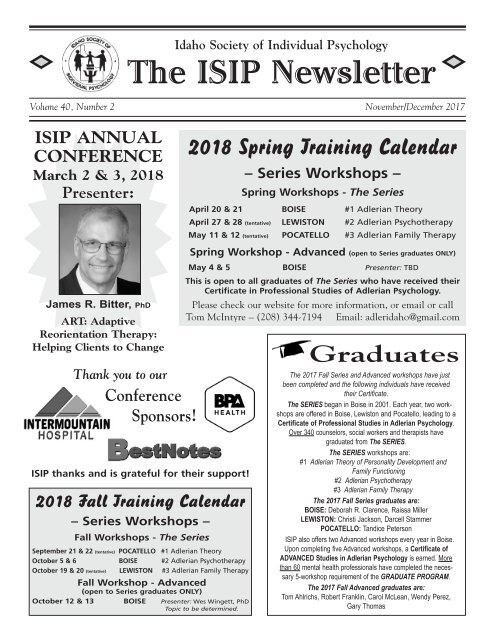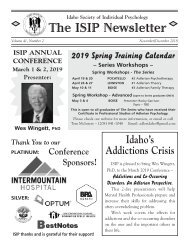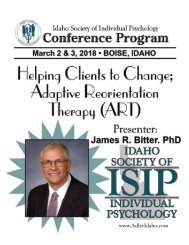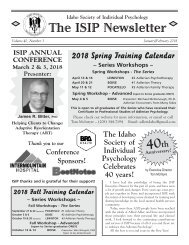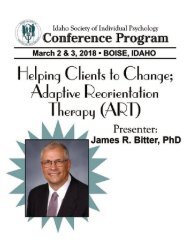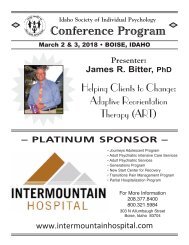ISIP Nov-Dec 2017 Newsletter
You also want an ePaper? Increase the reach of your titles
YUMPU automatically turns print PDFs into web optimized ePapers that Google loves.
Idaho Society of Individual Psychology<br />
The <strong>ISIP</strong> <strong>Newsletter</strong><br />
Volume 40, Number 2 <strong>Nov</strong>ember/<strong>Dec</strong>ember <strong>2017</strong><br />
<strong>ISIP</strong> ANNUAL<br />
CONFERENCE<br />
March 2 & 3, 2018<br />
Presenter:<br />
2018 Spring Training Calendar<br />
– Series Workshops –<br />
Spring Workshops - The Series<br />
April 20 & 21 BOISE #1 Adlerian Theory<br />
April 27 & 28 (tentative) LEWISTON #2 Adlerian Psychotherapy<br />
May 11 & 12 (tentative) POCATELLO #3 Adlerian Family Therapy<br />
James R. Bitter, PhD<br />
ART: Adaptive<br />
Reorientation Therapy:<br />
Helping Clients to Change<br />
Thank you to our<br />
Conference<br />
Sponsors!<br />
<strong>ISIP</strong> thanks and is grateful for their support!<br />
2018 Fall Training Calendar<br />
– Series Workshops –<br />
Fall Workshops - The Series<br />
September 21 & 22 (tentative) POCATELLO #1 Adlerian Theory<br />
October 5 & 6 BOISE #2 Adlerian Psychotherapy<br />
October 19 & 20 (tentative) LEWISTON #3 Adlerian Family Therapy<br />
Fall Workshop - Advanced<br />
(open to Series graduates ONLY)<br />
October 12 & 13 BOISE Presenter: Wes Wingett, PhD<br />
Topic to be determined.<br />
Spring Workshop - Advanced (open to Series graduates ONLY)<br />
May 4 & 5 BOISE Presenter: TBD<br />
This is open to all graduates of The Series who have received their<br />
Certificate in Professional Studies of Adlerian Psychology.<br />
Please check our website for more information, or email or call<br />
Tom McIntyre – (208) 344-7194 Email: adleridaho@gmail.com<br />
Graduates<br />
The <strong>2017</strong> Fall Series and Advanced workshops have just<br />
been completed and the following individuals have received<br />
their Certificate.<br />
The SERIES began in Boise in 2001. Each year, two workshops<br />
are offered in Boise, Lewiston and Pocatello, leading to a<br />
Certificate of Professional Studies in Adlerian Psychology.<br />
Over 340 counselors, social workers and therapists have<br />
graduated from The SERIES.<br />
The SERIES workshops are:<br />
#1 Adlerian Theory of Personality Development and<br />
Family Functioning<br />
#2 Adlerian Psychotherapy<br />
#3 Adlerian Family Therapy<br />
The <strong>2017</strong> Fall Series graduates are:<br />
BOISE: Deborah R. Clarence, Raissa Miller<br />
LEWISTON: Christi Jackson, Darcell Stammer<br />
POCATELLO: Tandice Peterson<br />
<strong>ISIP</strong> also offers two Advanced workshops every year in Boise.<br />
Upon completing five Advanced workshops, a Certificate of<br />
ADVANCED Studies in Adlerian Psychology is earned. More<br />
than 60 mental health professionals have completed the necessary<br />
5-workshop requirement of the gRaduaTE pRogRam.<br />
The <strong>2017</strong> Fall advanced graduates are:<br />
Tom Ahlrichs, Robert Franklin, Carol McLean, Wendy Perez,<br />
Gary Thomas
The <strong>ISIP</strong> <strong>Newsletter</strong><br />
We are contemplating<br />
adding a “Question & Q&<br />
A<br />
Answer” column in future<br />
issues. Please drop us a<br />
note at the P.O. Box, and<br />
let us know if you would<br />
like to see this. Feel free to start<br />
sending and questions you may have<br />
about Alderian Individual<br />
Psychology.<br />
WHAT IS <strong>ISIP</strong>?<br />
The Idaho Society of Individual<br />
Psychology is an organization of people<br />
in Idaho who are interested in<br />
furthering the concepts of<br />
Individual Psychology, the psychology<br />
of Alfred Adler.<br />
What is<br />
Individual Psychology?<br />
Individual Psychology is a philosophical<br />
approach to understanding<br />
human behavior based on the teachings<br />
of Alfred Adler. Individual<br />
Psychology helps us understand that<br />
all of our behavior is purposeful and<br />
the purpose for behavior is to find a<br />
meaningful place in any group.<br />
Individual Psychology is also<br />
based on the idea that all human<br />
beings have goals for themselves as<br />
demonstrated by their behaviors and<br />
those goals can help the individual<br />
achieve meaningfulness in their life.<br />
Individual Psychology emphasizes<br />
behavior that is based on mutual<br />
respect, social interest and cooperation.<br />
SIGNIFICANT ADLERIAN CONTRIBUTORS<br />
Each year at the <strong>ISIP</strong> Conference,<br />
we recognize individuals who have<br />
shown a commitment to the principles<br />
of Adlerian psychology through<br />
their work, in their family, or in<br />
their life. Adlerians are “born”, as<br />
well as “trained”, and many of us<br />
know effective and successful parents,<br />
community leaders, and compassionate<br />
people<br />
whose lives show such<br />
commitment.<br />
Each year we strive<br />
to recognize someone<br />
from the professional<br />
category as well as the<br />
non-professional category.<br />
We cannot do this<br />
without your help.<br />
Please send us your nominations.<br />
Nominations need to include the<br />
name and description of contributions<br />
the person has made in their<br />
family, their workplace, their spiritual<br />
life, or their community.<br />
Mail your nominations to <strong>ISIP</strong>,<br />
P.O. Box 284, Boise, Idaho 83701-<br />
0284, or phone us at (208) 344-7194<br />
Being recognized<br />
as a Significant<br />
Adlerian Contributor<br />
is an experience<br />
one never forgets.<br />
Wouldn’t you<br />
like to give that<br />
opportunity to<br />
someone special<br />
you know?<br />
<strong>2017</strong>-2018 <strong>ISIP</strong> BOARD<br />
President:<br />
Ted Warstadt 208-215-5312<br />
President-Elect:<br />
Barry Watts 208-869-0714<br />
Secretary:<br />
Kimberly Ledwa 208-376-5683<br />
Treasurer:<br />
Julene Coston 208-859-5354<br />
Historian:<br />
David Teed 208-424-3105<br />
Being recognized as a<br />
Significant Adlerian<br />
Contributor is an<br />
experience . . .<br />
<strong>ISIP</strong> WEBSITE<br />
You will find a full range of professional articles, workshop and conference<br />
announcements, news postings, conversation forums, and<br />
additional resources. Please visit regularly and check us out!<br />
www.adleridaho.ORG<br />
The <strong>ISIP</strong> <strong>Newsletter</strong><br />
Volume 40, Number 2 – <strong>Nov</strong>ember/<strong>Dec</strong>ember <strong>2017</strong><br />
Published three times each year by:<br />
Idaho Society of Individual Psychology<br />
P.O. Box 284, Boise, Idaho 83701<br />
<strong>ISIP</strong> membership and newsletter subscription is included in Annual<br />
Conference and event registration. We encourage readers to send<br />
news, suggestions, ideas and opinions.<br />
40th<br />
Anniversary!<br />
Past President:<br />
Susie Johnson 208-859-5967<br />
Members at Large:<br />
Rodney Dodson 208-559-6372<br />
Tim Hansen 208-746-6278<br />
Edward Mowry 208-376-8747<br />
Bradley Lambson 208-569-4316<br />
Executive Director:<br />
Tom McIntyre 208-344-7194<br />
– 2 –
The <strong>ISIP</strong> <strong>Newsletter</strong><br />
Maybell Memos<br />
[The following essay, reprinted by permission of THE VISTA<br />
(CA) PRESS, was one of a series by members of the author’s community<br />
mental health agency. More inquiries were received in<br />
response to it than had been stimulated by any previous article.]<br />
Anger is a very misunderstood emotion.<br />
How many times have you heard someone<br />
say, “He made me angry” or, “I have a short<br />
fuse” or “I lost my temper”?<br />
What all of these familiar statements have<br />
in common is a way of looking at anger that<br />
makes us appear to be innocent victims of it,<br />
and certainly not responsible for our expression<br />
of it. After all, he made me angry, and if<br />
I have a short fuse sudden explosions are<br />
inevitable, and if my temper is lost how can I<br />
be responsible for it?<br />
There is another way of understanding<br />
anger that is not so easy for some of us to<br />
accept. This view sees anger as something<br />
only we can create for ourselves. And, it<br />
maintains, we create it for a purpose.<br />
What purpose could possibly be served by<br />
anger, you ask? The answer is really quite simple.<br />
We create anger to fortify our ability to<br />
more effectively dominate, defeat, or intimidate<br />
others. In other words, to be more effective<br />
at fighting those people we perceive as<br />
threatening, or in the way of what we want to<br />
accomplish. What is the purpose of fighting?<br />
To win, of course, no one ever fought to lose.<br />
Anger (and other emotions, for that matter)<br />
is much like the fuel in our automobile.<br />
We put the fuel in our automobile to help us<br />
to move, and we choose the direction that the<br />
ANGER –<br />
The Misunderstood<br />
Emotion<br />
automobile travels, toward our desired destination.<br />
The problem with anger in this context is<br />
that it inevitably leads us to further conflict,<br />
violating the principle of mutual respect, the<br />
key ingredient in all healthy relationships.<br />
When we generate anger, we are consumed<br />
with winning, which means someone else has<br />
to lose. Instead of solving problems, we are<br />
creating problems.<br />
To be human is to experience anger.<br />
However, it is important that we understand<br />
our anger and realize that we have a choice of<br />
what to do with it. When we address another<br />
person in anger, the outcome is predictably<br />
consistent: opposition, conflict, and alienation.<br />
In most all cases it is best to wait until<br />
we are feeling more calm and receptive, and<br />
then engage the other person in a respectful<br />
dialogue with a view toward solving the problem.<br />
Many also find that by pausing and reflecting,<br />
we can become more aware of what we’re<br />
up to when we are angry - what our true goal<br />
is in the situation and how anger supports it.<br />
We can then decide if we want to support the<br />
goal of domination, or consider the more<br />
effective goal of solving the problem.<br />
Copyright © 1989 by Steven A. Mayben, Ph.D. Published in the Vista Press (CA) and in the newsletter<br />
of the North American Society of Adlerian Psychology<br />
– 3 –
The <strong>ISIP</strong> <strong>Newsletter</strong><br />
THE LEXICON OF ADLERIAN PSYCHOLOGY<br />
What is a lexicon? From the book itself, “A lexicon is a stock of terms used in a particular profession, subject, or style; a vocabulary.”<br />
INFERIORITY COMPLEX<br />
Jane Griffith/Robert L. Powers<br />
Inferiority complex is a term attributed to and adopted by Adler though, according to H. L. and R.<br />
R. Ansbacher (p. 256), probably not originating with him. It refers to those FEELINGS OF INFERI-<br />
ORITY which are experienced as personal deficiencies as opposed to the universal sense of incompleteness.<br />
As such they may come to be felt as so overwhelming that they undermine the COURAGE to<br />
move forward with life, to meet and overcome obstacles, and to develop oneself and make a CON-<br />
TRIBUTION to the community. The term inferiority complex applies when INFERIORITY FEEL-<br />
INGS cease to be a spur to further growth and become themselves a rationale for a HESITATING<br />
ATTITUDE. [As elsewhere in this text, note the distinction between two meanings of the word FEEL-<br />
ING: one is affect, EMOTION; the other (as here) apprehension, sense of things.]<br />
It is not the SENSE OF INFERIORITY which matters but the degree and character of it (p. 257).<br />
The abnormal FEELING OF INFERIORITY has acquired the name 'inferiority complex' (p. 257).<br />
It is more than a complex; it is almost a disease (p. 257).<br />
[INFERIORITY FEELING] becomes a pathological condition only when the sense of inadequacy<br />
overwhelms the individual and, far from stimulating him to useful activity, makes him<br />
depressed and incapable of development (p. 258).<br />
The inferiority complex is the presentation of the person to himself and others that he is not<br />
strong enough to solve a given problem in a socially useful way (p. 258).<br />
The inferiority complex, that is, the persistence of the consequences of the feeling of inferiority<br />
and the retention of that feeling, finds its explanation in greater lack of SOCIAL INTEREST<br />
(p. 258).<br />
We say that a person is suffering from an "inferiority complex" when he reacts fatalistically to<br />
a crippling situation, real or fancied, without attempting to correct or improve it (Adler,<br />
Alexandra, 197 1, p. 3).<br />
The "inferiority complex" does not lead to any compensation. It is a deadlock for any further<br />
development (Dreikurs, 1973d, p. 180).<br />
The inferiority complex involves an appeal to INFERIORITY FEELINGS, as if in themselves<br />
they constituted a handicap, and so may be offered as an excuse from participation and contribution.<br />
In fact, in the "complex" they are rehearsed and made to serve as a disguise for loss of<br />
COURAGE, or an alibi for failure (B. H. Shulman, personal communication, n.d.).<br />
Capitalized words refer to a cross reference to other terms in the Lexicon.<br />
Page number quotations are from A. Adler (1946a) The Individual Psychology of Alfred Adler.<br />
Readers of the <strong>ISIP</strong> <strong>Newsletter</strong> may purchase a copy of The Lexicon of Adlerian Psychology for $50.00 plus $6.00 S&H.<br />
Send payment and inquiries for bookstore or group discounts to: Adlerian Psychology Associates, Ltd., PO Box 1450,<br />
Port Townsend, WA 98368 – Email: Adlerpsy@olypen.com<br />
– 4 –
The <strong>ISIP</strong> <strong>Newsletter</strong><br />
Volunteers Needed as We Grow!<br />
Thank you for being a member of Idaho’s Adlerian training organization. Idaho Society of<br />
Individual Psychology is now a model for the Adlerian affiliate organizations in the United<br />
States and Canada. We have been blessed to have great presenters who have shared their skill,<br />
talent, and generosity of spirit. We also appreciate those that have assisted in the past by volunteering<br />
with Annual Conference set-up, Series trainings, and Advanced trainings.<br />
I am very grateful for this organization and for the teachings of Alfred Adler. Central to<br />
Adler’s teachings is the ongoing need for encouragement in life. Individual Psychology helps us<br />
all “understand” life’s challenges and confusing events. For example, we all know that personal<br />
challenges can hinder a person’s development while perhaps another person may “appear” to<br />
travel an unobstructed path toward the attainment of his or her goals. Still, Adler’s teachings<br />
show us that looking for superiority or inferiority may reap very narrow, constricting, self-assuming,<br />
and socially disconnected emotional results – and at the expense of one’s peace of mind.<br />
Adler encouraged improving our individual talents while additionally engaging in constructive<br />
involvement with our fellow beings. Our personal challenges can never eliminate the<br />
opportunity for individual growth and development. Ironically, we often find that our most significant<br />
personal accomplishments occur amid life’s most difficult and undesirable challenges.<br />
Such it was with Adler – he experienced significant challenges while selflessly teaching others<br />
how to courageously meet life’s demands.<br />
With the growth we have experienced, <strong>ISIP</strong>’s Board of Directors realizes the need for more<br />
input from members. Specifically, the Board would benefit from your volunteer assistance by<br />
offering your expertise in selective areas of:<br />
• Website Appearance<br />
• Marketing and <strong>ISIP</strong> Promotion<br />
• Membership Committee<br />
• Regional Contact person<br />
• Book Club organizer<br />
• other areas identified as important to our growth<br />
Your participation could involve participation in one of the above mentioned areas.<br />
Thank you for your consideration of volunteering with the Idaho Society of Individual<br />
Psychology. If you would like to participate, please e-mail me at twwarstadt@yahoo.com<br />
Appreciatively,<br />
Ted W. Warstadt<br />
President of the Board of Directors<br />
Idaho Society of Individual Psychology<br />
– 5 –
The <strong>ISIP</strong> <strong>Newsletter</strong><br />
The History of <strong>ISIP</strong>’s Training Program<br />
by Dale Babcock, Past President and Member Emeritus<br />
The Idaho Society of Individual Psychology was chartered in 1977. <strong>ISIP</strong>’s sole purpose is to encourage the use of<br />
Adlerian ideas in therapy and life. The first Conference was the held following year. <strong>ISIP</strong> has continued to have an Annual<br />
Conference since its inaugural one, with the Board choosing the presenters. The Board also sends representatives to the<br />
National Adlerian Conference to look for speakers who have the energy, knowledge, and the ability to do demonstrations<br />
with Adlerian theory and practice. In 2001, the Board began “The Series”, which is a series of three classes. Dr. Steve<br />
Maybell was the first presenter and is the author of this Series. Dr. Maybell has also written several books including Calming<br />
The Family Storm. Steve was also willing to give of his time and ideas to <strong>ISIP</strong>. <strong>ISIP</strong> would not be what it is today without<br />
his contributions. Steve studied with Robert Powers who studied with Rudolf Dreikurs. “The Series” is three classes which<br />
study Adlerian Theory of Personality Development and Family<br />
Functioning, Adlerian Psychotherapy, and Adlerian Family<br />
Therapy. At this time, more than 330 have completed the series.<br />
Thank you, Steve.<br />
Participants of The Series have asked, what now? The Board<br />
decided to add the Advanced Series, which began in 2005. The<br />
Advanced Certificate is earned by taking an additional five classes<br />
and attending an additional Conference. At this time, more that 65 participants have earned the Advanced Certificate.<br />
The main presenter of our Advanced Series has been Wes Wingett. He presents all over the world with his dynamic style<br />
and his demonstrations are often compared to Alfred Adler’s. Wes also reaches out to the community when he is here,<br />
touching the lives of many others. Thank you, Wes.<br />
The Advanced Series continues to have the best of the best as presenters. Frank Walton has presented on Family<br />
Therapy and he is known to be the best in the Adlerian world in the area of family therapy. He also studied with Dreikurs.<br />
Jim Bitter has presented on Group Therapy to the Advanced group, as well as presenting at the Conference many times.<br />
<strong>ISIP</strong> likes to claim Jim as our own, as he earned his doctorate at ISU. He has done much writing in the Adlerian area along<br />
with being an international speaker. He studied with many skilled Adlerians, among them Virginia Satir. Jim also does<br />
amazing demonstrations. Thank you, Jim for the donation of your<br />
<strong>ISIP</strong> provides the most<br />
Adlerian training anywhere<br />
in the nation.<br />
<strong>ISIP</strong>’s sole purpose is to<br />
encourage the use of Adlerian<br />
ideas in therapy and life.<br />
time and ideas.<br />
I am not able to name all of the Hall of Fame presenters <strong>ISIP</strong><br />
has had come to Boise. Due to the history of top-notch presenters,<br />
most of the NASAP presenters consider it a real honor to be selected<br />
to present at an <strong>ISIP</strong> function here. <strong>ISIP</strong> provides the most<br />
Adlerian training anywhere in the nation.<br />
<strong>ISIP</strong>’s Conference is one of the largest in attendance of the Adlerian ideas in the nation. We have been very lucky to<br />
have the quality of presenters at our training. No one in the nation has had better training in Adlerian psychology than<br />
<strong>ISIP</strong>. The Board, and you as participants, have made this happen. This is supported by our current presenter, Dr. Jim Bitter<br />
stating, “This new plan envisions the development of a growing number of NASAP affiliates, which will become the heart and soul<br />
of Adlerian Psychology and Adlerian training across North America. I don’t believe we have put it quite this way before, but my goal<br />
would be the development of a NASAP affiliate in every state and province within the next twenty-five years. In these affiliates, conferences<br />
would be held; training and education would take place; certification would happen; and maybe even the next generation of<br />
scholars would emerge. In this sense, NASAP, over the next few – maybe many – years will become more of a network of organizations<br />
rather than a central organization. We may even get to a point – I know this will be many years down the line – where<br />
Conventions happen annually in affiliate sites, and we have a National Convention, perhaps once every three years. All of that is<br />
still to be developed.”<br />
I emailed him saying that this sounds a lot like <strong>ISIP</strong>. Jim’s reply was, “You are so right!! I want an Idaho-type affiliate in<br />
every state.”<br />
Thank you Board, Executive Director Tom McIntyre, and each of you for helping make <strong>ISIP</strong> what it is today!<br />
– 6 –
The <strong>ISIP</strong> <strong>Newsletter</strong><br />
Edgar’s<br />
Corner<br />
Are You Worth $14.65?<br />
by Thomas E. Edgar, Ed.D.<br />
How much are you worth? Probably about $14.65 on<br />
the open, scrap-metal market. If all the elements in<br />
your body – the iron, copper, zinc, calcium and sulphur<br />
– were reclaimed, there really wouldn’t be very much to<br />
show. And, worst of all, that $14.65 is cast in grossly<br />
inflated dollars.<br />
Most of us, though, are not willing to cash in on the<br />
bonanza. Sometimes we really feel pretty good-fornothing<br />
and feel we’d like to toss in the towel. But<br />
most of the time we somehow feel that we are worth<br />
more than the market value of the basic stuff of which<br />
we are constructed.<br />
If indeed you feel worth more than $14.65, just how<br />
much are you worth as a human being? It is popular to<br />
talk of our worth as being infinite, unlimited. Some<br />
suggest that God, at least, considers us to be of limitless<br />
value. It is part of the dogma of democracy to claim<br />
that all people are created equal in worth and to say<br />
further that our worth is without end. That is theorhetoric<br />
and the dream.<br />
In fact, though, most of us place our worth as<br />
humans on the line every day. We make our human<br />
value, our worth, conditional upon something outside<br />
ourselves. We say, “Unless I am loved by people important<br />
to me, I am worthless” or “Unless I do everything<br />
right all the time, I am a piece of worthless dung” or “I<br />
should be a perfect parent. If I am not, I have no value,<br />
no meaning, no place” or “Unless I am noticed all the<br />
time and am the center of attention, I am nothing” or<br />
“I need to be approved by absolutely everyone all the<br />
time, or I am without value.”<br />
We all have our own versions of this theme, our own<br />
creative and ingenious ways to place our value on the<br />
line. It is my contention that you are heading for trouble<br />
if you compete the sentence, “My worth as a human<br />
being depends on or is conditional upon, __________”<br />
with any word or term.<br />
If you cannot accept your infinite worth as a human<br />
being as unconditional, then bad things nearly always<br />
follow in life. Suppose, as an example, I complete the<br />
sentence in the fashion: “I am a worthwhile person<br />
only when I am seen as perfect by others.” How does<br />
this affect me? How does this affect my performance<br />
and my relationships as I live my life?<br />
First, I will only do those things I can be sure I can<br />
do well. If I try new things I might make a mistake and<br />
my worth would be gone. I give up being spontaneous.<br />
I adopt the motto: nothing ventured, nothing lost.<br />
I begin to hide my faults and shortcomings from others<br />
because if they see me as I see myself that would be<br />
awful. I erect a facade. I remain distant and unwilling<br />
to share all the sides of me with others, leaving them<br />
generally to think of me as aloof, cold, distant and<br />
stuck up. They don’t know that I am afraid to let them<br />
see me as I am. The price is isolation and loneliness.<br />
The gain? Being safe!<br />
This is not to say that we should not evaluate our<br />
behavior. Of course we need to decide what we want to<br />
do better in the future and how we wish to improve.<br />
But I suggest that we would be better off if we would<br />
learn to separate the deed from the doer. We can feel<br />
that we have failed in our tasks in life without counting<br />
ourselves a failure.<br />
All of us will one way or another complete some version<br />
of this sentence: “I am worthwhile only when<br />
___________________.” I challenge each of you to<br />
consider the ways in which you complete the sentence<br />
and to reflect on the impact this has on your life and<br />
on your relationships with other people.<br />
Tom Edgar, Ed.D., is a Professor Emeritus from Idaho State University. One of his areas of expertise is Adlerian Psychology.<br />
He has authored numerous articles in the Journal of Individual Psychology.<br />
– 7 –
<strong>ISIP</strong> 2018 CONFERENCE<br />
MARCH 2 & 3, 2018<br />
ART: Adaptive Reorientation Therapy:<br />
Helping Clients to Change<br />
Presenter - James R. Bitter, PhD<br />
WHO SHOULD ATTEND? Counselors, Social Workers, Corrections, Case<br />
Managers, Psychologists, Nurses, Child Care Providers, Teachers, Parents.<br />
WHY? This is a unique opportunity to learn from an outstanding<br />
Adlerian practitioner and teacher. Basic and underlying principles of Individual Psychology<br />
will be wrapped in Adlerian strategies of resilience and strength building.<br />
ABOUT OUR PRESENTER: James Robert Bitter is Professor of Counseling at East Tennessee<br />
State University. Jim is a Nationally Certified Counselor, who has written four books and more<br />
than 70 articles. He is a Diplomate in Adlerian Psychology (NASAP, 2002) and a former editor<br />
of the Journal of Individual Psychology.<br />
LOCATION: The Riverside Hotel, 2900 Chinden Blvd.,Garden City, ID 83714<br />
FOR RESERVATIONS call: (208) 343-1871<br />
For more information call (208) 344-7194.<br />
Mark Your<br />
CALENDAR!<br />
The <strong>ISIP</strong> <strong>Newsletter</strong><br />
P.O. Box 284<br />
Boise, ID 83701-0284<br />
NON-PROFIT ORG<br />
U S POSTAGE<br />
P A I D<br />
BOISE, ID 83709<br />
PERMIT NO. 679<br />
In This Issue . . .<br />
IDAHO SOCIETY OF INDIVIDUAL PSYCHOLOGY ANNUAL CONFERENCE<br />
Presenter - James R. Bitter, PhD<br />
“Anyone trainedin Adlerian<br />
Psychology knows what to do the<br />
first time they sit down with a client<br />
and through the process.”<br />
Wes Wingett & Steven Maybell<br />
2018<br />
ANNUAL CONFERENCE<br />
MARCH 2 & 3<br />
Includes 3 hours of<br />
ETHICS!


